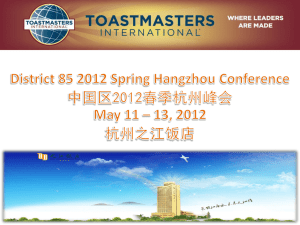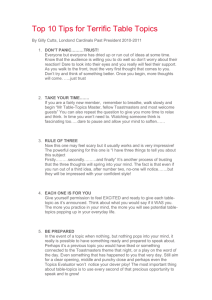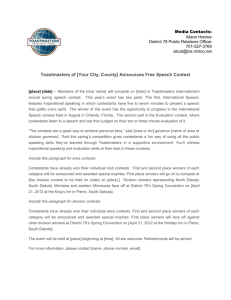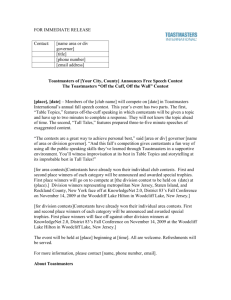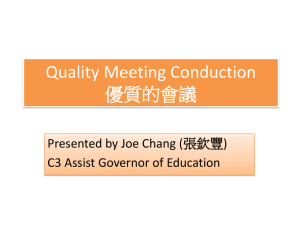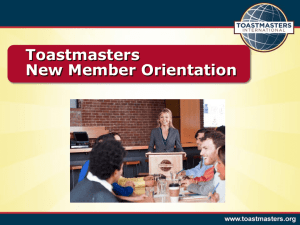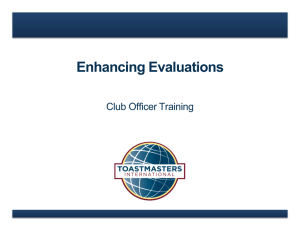Judging - Toastmasters UK South
advertisement
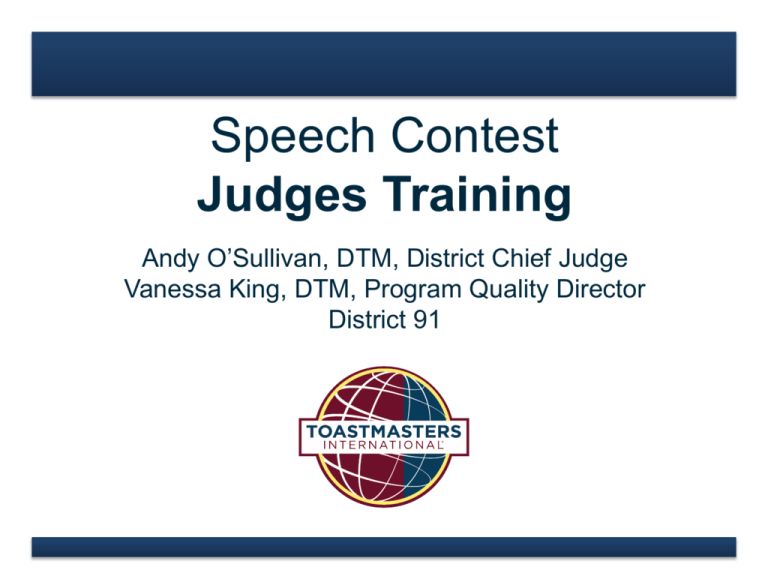
Speech Contest Judges Training Andy O’Sullivan, DTM, District Chief Judge Vanessa King, DTM, Program Quality Director District 91 Agenda When you’re the judge Purpose of contests Obligations of judges Judging vs evaluating Characteristics of good judges Barriers to objectivity Common misconceptions www.toastmasters.org Agenda The art of judging The judges guide and ballot in detail will include a break Discussion topics and case studies A workshop in contest judging www.toastmasters.org Three Purposes Speech contests provide: An opportunity to practice competitive speaking Interesting education programs for members and the public An opportunity to learn by observing proficient speakers www.toastmasters.org Judges have an obligation to: Contestants Toastmasters International Audience Themselves www.toastmasters.org Judging versus Evaluating Judging = selecting a winner Evaluating = appraisal and advice Judges’ decisions are confidential! www.toastmasters.org Good Judges Are… Accurate Fair Trustworthy Knowledgeable Good listeners www.toastmasters.org Barriers to Objectivity Speaker position Champion for the underdog Halo effect Reverse halo effect Second time around Not the norm Prejudices and personal preferences www.toastmasters.org Know the Rules! Prevent Misconceptions www.toastmasters.org Judge’s Guide and Ballot www.toastmasters.org The Judge’s Guide There are many different ways to use the Judges Guide… Take notes Use suggested points Use other point values Pluses and minuses ….. www.toastmasters.org Judging Categories Content Delivery Language www.toastmasters.org Content Development Effectiveness Value www.toastmasters.org Delivery Physical Voice Manner www.toastmasters.org Language Appropriateness Correctness www.toastmasters.org Discussion Topics & Case Studies What are the reasons for which a contestant may be disqualified? What happens if one judge leaves the blank for the third-place winner’s name empty on her ballot? During a contest, what is the procedure for addressing a protest regarding the originality of a speech? www.toastmasters.org Discussion Topics & Case Studies What is the appropriate action to take? A member approaches a contest official and asks to see the points awarded to contestants. Contest results are announced and the contest meeting is adjourned. After this an individual from the audience complains that judging was unfair. www.toastmasters.org Discussion Topics & Case Studies The speech contest rules state that all contestants will speak from the same area designated by the contest chair. If a contestant steps out of the designated speaking area, is he or she disqualified for this rule violation? www.toastmasters.org Discussion Topics & Case Studies What happens if: Four judges sign and print their names on their ballots. One judge only prints his name on his ballot, but does not sign it. One judge neither signs nor prints his name on his ballot. One judge only signs her name on her ballot. www.toastmasters.org Discussion Topics & Case Studies Three members compete at an area contest. One contestant is disqualified for speaking overtime. The two announced winners are not able to compete in the division contest. Can the disqualified contestant compete in the division contest? www.toastmasters.org Discussion Topics & Case Studies Just before an area International Speech Contest begins, you find out a contestant has completed only five projects in Competent Communication. The contest speech will be his sixth speech. www.toastmasters.org A Workshop in Contest Judging www.toastmasters.org Resources http://d91.toastmasters.org.uk/contests/ www.toastmasters.org
